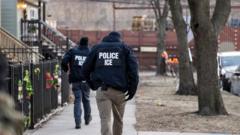Judge Terry Doughty expressed strong concerns that a two-year-old U.S. citizen, identified only as VML, may have been deported without due process alongside her Honduran mother and sister. A court hearing has been scheduled as uncertainties mount regarding her family's immigration status amidst intensified deportation efforts.
U.S. Judge Raises Concerns Over Possible Illegal Deportation of Young Citizen

U.S. Judge Raises Concerns Over Possible Illegal Deportation of Young Citizen
A federal judge questions the legality of a two-year-old U.S. citizen's deportation, highlighting systemic issues in the immigration process under the Trump administration.
A federal judge has raised serious concerns over the deportation of a two-year-old U.S. citizen, known only as VML, who may have been sent to Honduras without proper legal process. This issue arises from the heightened deportation efforts during the Trump administration, which have drawn widespread scrutiny.
Judge Terry Doughty indicated in a recent court filing that there exists "strong suspicion" that VML was deported without “meaningful process” following the family’s apprehension at a routine appointment at a New Orleans immigration office on April 22. The child was born in Louisiana, and her deportation reflects alarming practices within current immigration policies.
According to a spokesperson from the U.S. Department of Homeland Security, the mother made a voluntary choice to travel to Honduras with her children. However, judicial proceedings have revealed complications surrounding the legitimacy of the process. In an effort to verify VML's status, the judge aimed to arrange a phone call with the mother, but was informed by a government attorney that it was impossible, as she had already been released in Honduras.
While VML's U.S. citizenship is confirmed, the immigration status of her mother, father, and 11-year-old sister remains uncertain. Judge Doughty emphasized that it is unconstitutional to deport any U.S. citizen, which brings critical legal implications to this case.
A hearing scheduled for May 19 aims to further explore these issues and provide clarity around the legality of government actions regarding the deportation. In a related incident in Florida, a similar case involved a Cuban woman and her U.S. citizen husband who were similarly detained and expelled back to Cuba shortly after an immigration appointment.
The increasing detentions of undocumented immigrants have surged since the return of Donald Trump to the presidency on January 20, leading to various legal challenges surrounding these hardline immigration measures. A notable case involved the wrongful deportation of Kilmar Ábrego García, linked to the government’s claim of gang affiliation, which his family contests. The Supreme Court has intervened to address the situation, yet the government maintains that he will never return to the U.S.
As this controversial topic evolves, the implications of U.S. immigration laws continue to unfold, presenting challenges for many families caught in the crossfire of strict policies and legal frameworks.





















